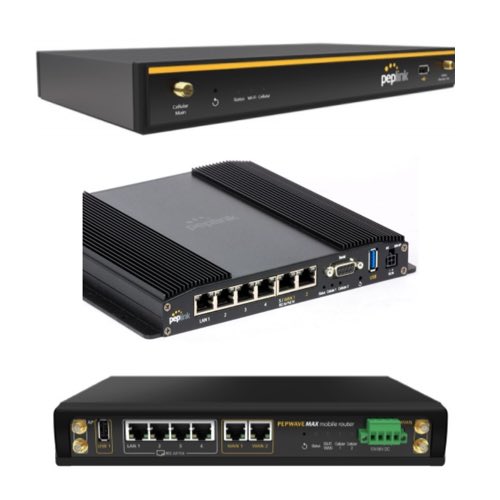Peplink Cellular Routers

Peplink cellular routers deliver dependable 4G and 5G internet connectivity for mobile, remote, and mission-critical networking environments. Designed to operate as primary or backup network devices, these routers are widely used in transportation fleets, first responder vehicles, industrial job sites, and remote monitoring systems where consistent connectivity is essential. Peplink routers are engineered to maintain stable connections even in areas with fluctuating signal strength.
The Peplink MAX Series, including models such as the MAX BR1, is known for its rugged construction, flexible configuration options, and support for true mobility. These cellular routers support multiple WAN connections, including Ethernet WAN, Wi-Fi WAN, and cellular, enabling automatic failover and load balancing. Advanced routing intelligence helps ensure data is prioritized and transmitted efficiently, supporting reliable performance across demanding applications.
Built for continuous operation in challenging conditions, Peplink cellular routers are easy to deploy and manage while supporting long-term reliability. Their robust hardware design, ongoing firmware updates, and proven performance make them suitable for use as both standalone mobile routers and integrated components within larger SD-WAN and enterprise networking architectures.
FAQs
Q: What are Peplink cellular routers used for?
Peplink cellular routers are used to provide reliable 4G and 5G internet connectivity in mobile, remote, and industrial applications. They are commonly deployed as primary or backup routers for fleets, job sites, and critical infrastructure.
Q: Are Peplink cellular routers suitable for mobile applications?
Yes. Peplink cellular routers are specifically designed for mobility and are widely used in vehicles, trailers, and portable installations where uninterrupted connectivity is required.
Q: Can Peplink cellular routers be used as backup internet connections?
Yes. Peplink routers support multiple WAN inputs and automatic failover, making them effective backup solutions when primary internet connections are unavailable or unstable.
Q: What makes Peplink routers reliable in challenging environments?
Peplink routers feature rugged hardware designs, intelligent routing technology, and advanced WAN management that help maintain stable connectivity in areas with variable signal conditions.
Q: Do Peplink cellular routers support long-term, continuous operation?
Yes. Peplink cellular routers are built for 24/7 operation and are commonly used in applications that require continuous, dependable network performance.
Why Buy Peplink Cellular Routers from RSP Supply
RSP Supply offers a full range of Peplink cellular routers designed to support reliable 4G and 5G connectivity in mobile and remote environments. Our selection supports industrial, transportation, and enterprise networking applications where durability, redundancy, and consistent performance are critical.

